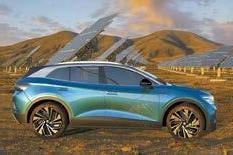
3 minute read
global briefs
Local Veggies
Huge Indoor Vertical Farm to Serve Food Desert
Advertisement
The agriculture startup Plenty Unlimited Inc. is building an indoor vertical farm in the South Los Angeles suburb of Compton to provide jobs and fresh produce to the historical “food desert” and surrounding areas. Traditional farms are usually only able to harvest crops a few times a year, but because Plenty’s hydroponic farms are free of the limitations of seasonal changes, weather conditions, pests and natural disasters, they can produce food year-round. The crops are cultivated in a clinically sanitary environment with full personal protective equipment for staff, as well as robots to do much of the picking. The first time produce is touched by human hands is when the consumer opens the package. Plenty’s project condenses 700 acres of farmland into a 95,000-square-foot warehouse. Its first vertical farm opened in South San Francisco in 2018, and it maintains a research and development farm in Laramie, Wyoming. By building farms vertically, healthy, quality produce can be grown without harming the environment, especially in urban areas, where land is limited and food insecurity may be widespread. In addition to the vertical plant towers, Plenty uses LED lighting and automation to plant, feed and harvest crops. The warehouses grow plants faster and with more nutritional density with no need for pesticides, using a fraction of the water required by traditional farming.
Rock On
Volcanic Ground Cover Slows Climate Change
Researchers are using recycled rock dust to enrich farm and rangeland soils to accelerate the processes by which soils capture atmospheric carbon. The natural process of rock weathering provides a proven method of capturing carbon from the atmosphere and putting it into the soil, where it may remain for centuries.
Benjamin Z. Houlton, the Ronald P. Lynch Dean of the Cornell College of Agriculture and Life Sciences, says, “Soil can be part of the solution set. It will not save us, but it can help to put us on path to negative emissions.” Field testing has been conducted for a year with positive early findings. Iris Holzer, a Ph.D. student at the University of California-Davis, has seen a doubling of the rate of carbon capture in soils with rock amendments compared to soils without.
Excess carbon speeds up the greenhouse effect, which causes rising temperatures and other challenges to global security, food production, economic growth, infrastructure and human and ecosystem health. Over a five-year period, crushed volcanic rock added to agricultural soils across the globe could remove 2.8 billion tons of carbon.
Gaining Momentum
Dealers Align Behind Electric Cars
Traditionally, auto dealerships have presented a skeptical and confusing experience for those seeking to purchase electric transportation. When Tesla launched the Model S electric sedan in 2012, it had to build its own stores to educate consumers about electric vehicles (EV) because dealers wouldn’t sell them in Texas or Michigan, for instance. The subsequent success of Tesla, Ford and GM EV models, along with a plan to stop selling new internal combustion cars by 2035 in California, have propelled the transition from fossil-fuel-powered vehicles. The American division of German automaker Volkswagen is delivering large quantities of their electric SUV ID.4 as part of a nationwide launch, with more than 650 dealers on board. U.S. CEO Scott Keogh reports that the goal is to have at least one vehicle initially at every VW dealer in America. He says, “We see the potential for EV sales to double this year. We’re optimistic that this is a turning point year for electric vehicles.”










